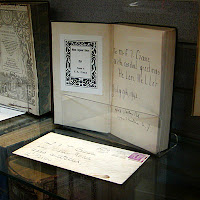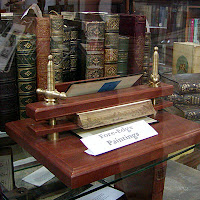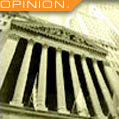

 We were trying to find a good used book store. We hit all the usual suspects: small shops downstairs from furniture showrooms, dusty dingy chain shops reeking of paperback glue. Then, almost by accident, we stumbled into the coolest little-known book shop in Atlanta. Only, it isn't a regular book shop and it sure isn't little. It's the Defoor Centre Mall, a showroom with over 15 used and rare book dealers all under one roof.
We were trying to find a good used book store. We hit all the usual suspects: small shops downstairs from furniture showrooms, dusty dingy chain shops reeking of paperback glue. Then, almost by accident, we stumbled into the coolest little-known book shop in Atlanta. Only, it isn't a regular book shop and it sure isn't little. It's the Defoor Centre Mall, a showroom with over 15 used and rare book dealers all under one roof.The Defoor Centre Mall opened on April 19, 2002 and was the brainchild of Virginia Velleca, owner of Books & Cases & Prints, and Debby Eason, the former owner of Creative Loafing and current owner of The Story. The Centre's raison d'etre: to keep the struggling small bookseller alive while also providing a venue for group meetings, literary events, and signings. The Centre also hosts an art gallery,The Story, and will soon expand to include theatre.
The Centre can cater to any book-hound's desires, whether you want to spend $1 or $30,000 (albeit, most of their customers are of the first variety). They have Megandorfer pop-ups, autographed Helen Keller and Jimmy Carters, first edition Poes, rare sport and fishing books, African-American and Southern studies, antiquaria such as bindings and plate books, fore-edge paintings, maps and charts, and enough used and rare books to satisfy even the most finicky tastes. You could spend hours trolling over it all. We did.
Glass cases protect the most valuable works from decay and Atlanta's 10 serious book thieves, but you'll still get to handle some impressive pieces. We were thrilled to handle a huge $1,000 two-volume leather bound edition of Imperial Shakespeare printed in 1844.
So take a trip over to the Defoor Centre...it's worth the visit even if you're just there to look around. The Centre is located just west of I-75 off Howell Mill.
Defoor Centre MallThe Centre is having a back room book sale July 20 to 27 where no book will price above $5. We'll be there for sure. fb
1710 Defoor Avenue
Atlanta, Georgia 30318
404.591.3901
Open 10:00am to 5:30pm, Monday through Saturday


